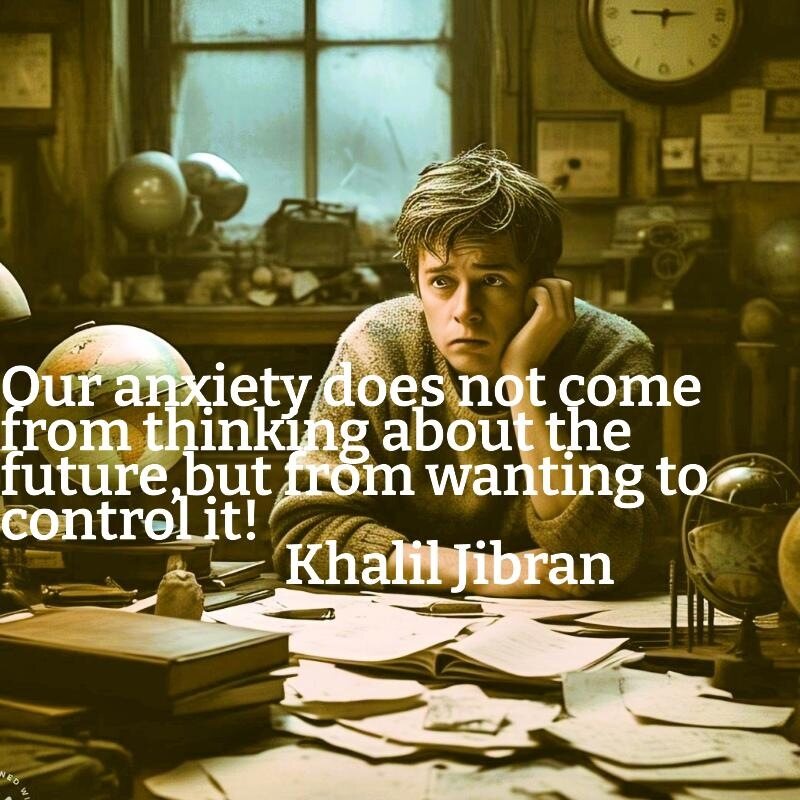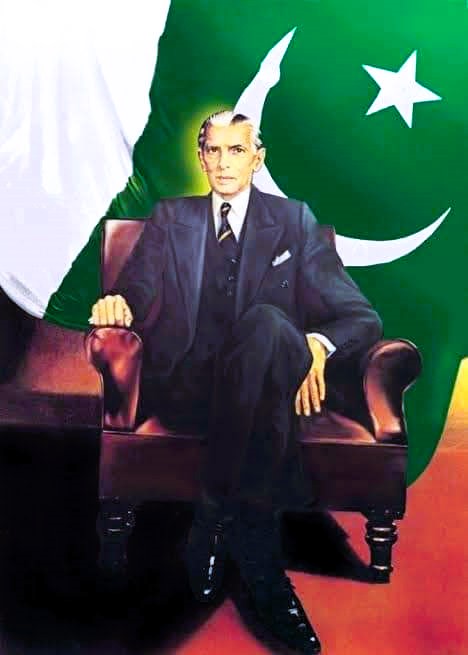Khalil Gibran once said: Our Anxiety Does Not Come from Thinking about the Future, But from Wanting to Control It.
ہماری پریشانی مستقبل کے بارے میں سوچنے سے نہیں بلکہ اس پر قابو پانے کی خواہش سے ہوتی ہے
1. Khalil Gibran once said, Our Anxiety Does Not Come from Thinking about the Future, But from Wanting to Control It. Anxiety is a typical emotion. He claims that worrying about the future is not the source of our anxiety. Rather, it stems from the desire to exert control over it. This concept guides anxiety management.

2. Knowing About Anxiety
Uncertainty is typically the root cause of anxiety. We are concerned about potential outcomes. More than that, though, we are concerned that we have no control over the result. This craving for control fuels our anxiousness.
3. Giving Up Control
Anxiety can be decreased by acknowledging that we have no control over everything. Unpredictability is a part of life. It is tiresome and frequently impossible to try to regulate every element. We may concentrate on what we can control when we let go.
4. Being mindful and in the present
Living in the present can control anxiety. Meditation and other mindfulness techniques can help us focus our attention on the here and now, lessening our desire to influence the future.
5. Accepting Unpredictability
It’s important to embrace uncertainty. There are many unknowns in life. Peace may result from acknowledging this fact. It enables us to adjust to changes without undue anxiety.
6. Doable Actions
a.Make reasonable goals: Concentrate on attainable objectives. This provides a feeling of mastery without causing excessive anxiety.
b. Develop Mindfulness: Take part in activities that help you stay in the moment. Simple walks, yoga, and deep breathing can all be beneficial.
c. Minimize Future Projections: Avoid thinking too much about the future. Make plans, but be adaptable.
d. Acknowledge Uncertainty: Recognize that certain situations are out of your control. It can be freeing to accept this.
In conclusion
Khalil Gibran’s observation serves as a reminder that worry is brought on by the impulse to control the future. We may lessen this fear by embracing unpredictability and keeping our attention on the here and now. A more tranquil and contented existence might result from relinquishing control.
خلیل جبران نے ایک بار کہا تھا، “ہماری پریشانی مستقبل کو کنٹرول کرنے کی خواہش سے آتی ہے۔”
اضطراب ایک عام جذبات ہے۔ مشہور شاعر خلیل جبران کا دعویٰ ہے کہ مستقبل کی فکر ہماری پریشانی کا باعث نہیں ہے۔ بلکہ، یہ اس پر قابو پانے کی خواہش سے پیدا ہوتا ہے۔ یہ تصور اضطراب کے انتظام پر رہنمائی فراہم کرتا ہے۔
اضطراب کے بارے میں جاننا
غیر یقینی صورتحال عام طور پر پریشانی کی بنیادی وجہ ہے۔ ہم ممکنہ نتائج کے بارے میں فکر مند ہیں۔ اس سے زیادہ، اگرچہ، ہم اس حقیقت سے پریشان ہیں کہ نتیجہ پر ہمارا کوئی کنٹرول نہیں ہے۔ کنٹرول کی اس خواہش سے ہماری بے چینی بڑھ جاتی ہے۔
کنٹرول چھوڑنا
یہ تسلیم کر کے اضطراب کو کم کیا جا سکتا ہے کہ ہمارا ہر چیز پر کوئی کنٹرول نہیں ہے۔ غیر متوقع زندگی کا ایک حصہ ہے۔ ہر عنصر کو منظم کرنے کی کوشش کرنا تھکا دینے والا اور اکثر ناممکن ہے۔ جب ہم جانے دیتے ہیں تو ہم اس پر توجہ مرکوز کرسکتے ہیں جس پر ہم قابو پاسکتے ہیں۔
ہوشیار رہنا اور حال میں
موجودہ حالات میں رہ کر پریشانی پر قابو پایا جا سکتا ہے۔ مراقبہ اور ذہن سازی کی دیگر تکنیکیں ہماری توجہ یہاں اور ابھی پر مرکوز کرنے میں ہماری مدد کر سکتی ہیں۔ اس سے مستقبل پر اثر انداز ہونے کی خواہش کم ہو جاتی ہے۔
غیر متوقع صلاحیت کو قبول کرنا
غیر یقینی صورتحال کو قبول کرنا ضروری ہے۔ زندگی میں بہت سے نامعلوم ہیں۔ اس حقیقت کو تسلیم کرنے سے امن قائم ہو سکتا ہے۔ یہ ہمیں بغیر کسی پریشانی کے تبدیلیوں کو ایڈجسٹ کرنے کے قابل بناتا ہے۔
قابل عمل اقدامات
- معقول اہداف بنائیں: قابل حصول مقاصد پر توجہ دیں۔ یہ ضرورت سے زیادہ پریشانی پیدا کیے بغیر مہارت کا احساس فراہم کرتا ہے۔
قابل عمل اقدامات
- معقول اہداف بنائیں:قابل حصول مقاصد پر توجہ دیں۔ یہ ضرورت سے زیادہ پریشانی پیدا کیے بغیر مہارت کا احساس فراہم کرتا ہے۔
- ذہن سازی کو فروغ دیں: ایسی سرگرمیوں میں حصہ لیں جو آپ کو اس لمحے میں رہنے میں مدد کرتی ہیں۔ سادہ چہل قدمی، یوگا اور گہرے سانس لینے سے فائدہ ہو سکتا ہے۔
- 3. مستقبل کے تخمینوں کو کم سے کم کریں: مستقبل کے بارے میں بہت زیادہ سوچنے سے گریز کریں۔ منصوبے بنائیں، لیکن موافق بنیں۔
- غیر یقینی صورتحال کو تسلیم کریں: تسلیم کریں کہ بعض حالات آپ کے قابو سے باہر ہیں۔ یہ قبول کرنے کے لئے آزاد ہو سکتا ہے
آخر میں
خلیل جبران کا مشاہدہ ایک یاد دہانی کا کام کرتا ہے کہ فکر مستقبل پر قابو پانے کے جذبے سے جنم لیتی ہے۔ ہم اس خوف کو غیر متوقع طور پر قبول کر کے اور اپنی توجہ یہاں اور ابھی پر رکھ کر کم کر سکتے ہیں۔ ایک زیادہ پرسکون اور مطمئن وجود کنٹرول چھوڑنے کے نتیجے میں ہوسکتا ہے۔
Khalil Gibran (born January 6, 1883, Bsharrī, Lebanon—died April 10, 1931, New York, New York, U.S.) was a Lebanese-American philosophical essayist, novelist, poet, and artist.
One of The Marvels of The World 2024: The Sight of a Soul Sitting in Prison With the Key in Its Hand
